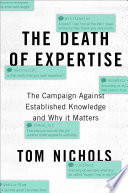

In today's digital age, the internet has democratized information access, allowing anyone to become an 'expert' in their field, regardless of their actual qualifications or experience. This shift has led to a culture where amateur opinions often overshadow the insights of trained professionals. The book discusses how platforms like social media enable individuals to share their thoughts widely, creating a false sense of expertise. This phenomenon can undermine trust in actual experts, as the general public may favor the opinions of relatable amateurs over those of seasoned professionals. The author argues that this trend poses a significant risk, especially in fields that require specialized knowledge, such as medicine, science, and technology. The implications are profound, as decisions made based on amateur advice can lead to harmful consequences.
Continue readingThe book highlights a growing skepticism towards experts, fueled by a combination of historical failures, media sensationalism, and the rise of alternative viewpoints. Many people have witnessed instances where experts have been wrong, leading to a general distrust. This skepticism can be healthy in moderation, encouraging critical thinking and questioning of authority. However, the author warns that excessive skepticism can lead to a rejection of valuable expertise and evidence-based knowledge. This idea is particularly relevant in the context of public health and safety, where expert opinions are crucial for informed decision-making. The challenge lies in finding a balance between healthy skepticism and blind rejection of expert advice.
Continue readingThe book discusses how the sheer volume of information available today can lead to confusion and misinformation. With so many sources providing conflicting information, individuals struggle to discern credible expertise from unreliable opinions. This information overload can create a paradox where more knowledge does not equate to better understanding. The author emphasizes the importance of media literacy and critical thinking skills in navigating this complex landscape. Without these skills, individuals may fall prey to misinformation, leading to poor decisions in areas such as health, finance, and technology. The book advocates for educational reforms that prioritize these skills to empower individuals in the digital age.
Continue readingEducation plays a critical role in developing expertise, yet the book argues that many educational systems are failing to prepare individuals for the complexities of modern life. The focus on standardized testing and rote memorization often undermines the development of critical thinking and problem-solving skills. The author calls for a reevaluation of educational priorities, emphasizing the importance of fostering a deeper understanding of subjects rather than superficial knowledge. This shift could help cultivate a generation that values expertise and understands the nuances of complex issues. The book also highlights the responsibility of educational institutions to promote a culture of respect for expertise and the importance of lifelong learning.
Continue readingThe rise of anti-intellectualism is a central theme in the book, with the author exploring how this phenomenon has permeated various aspects of society. Anti-intellectualism fosters an environment where expertise is devalued, and emotional appeals often take precedence over rational discourse. This trend can lead to a polarization of opinions and a breakdown of constructive dialogue. The book examines how anti-intellectualism manifests in politics, media, and social interactions, ultimately hindering progress and innovation. The author argues that combating anti-intellectualism requires a concerted effort to promote critical thinking and respect for expertise, as well as a commitment to engaging in civil discourse.
Continue readingTrust is a fundamental component of expertise, yet the book illustrates how trust in experts has eroded over time. Factors such as scandals, misinformation, and the politicization of knowledge have contributed to this decline. The author argues that rebuilding trust in expertise is essential for society to function effectively. This involves not only acknowledging past mistakes but also demonstrating transparency and accountability in expert practices. The book suggests that experts must engage with the public, communicate their knowledge effectively, and be open to feedback to restore trust. The importance of trust extends beyond individual experts to institutions and systems that rely on expert knowledge for decision-making.
Continue readingThe book concludes with a reflection on the future of expertise in an increasingly complex and rapidly changing world. The author posits that while the challenges facing expertise are significant, there is also an opportunity for a renaissance of respect for knowledgeable professionals. By embracing technology and fostering a culture of inquiry and learning, society can create an environment where expertise is valued and sought after. The author encourages readers to advocate for policies that support education, critical thinking, and the responsible dissemination of information. Ultimately, the future of expertise depends on the collective efforts of individuals, educators, and institutions to prioritize knowledge and understanding in an age of uncertainty.
Continue readingThe reading time for The Death of Expertise depends on the reader's pace. However, this concise book summary covers the 7 key ideas from The Death of Expertise, allowing you to quickly understand the main concepts, insights, and practical applications in around 23 min.
The Death of Expertise is definitely worth reading. The book covers essential topics including The Rise of the Amateur, Skepticism Towards Experts, The Impact of Information Overload, providing practical insights and actionable advice. Whether you read the full book or our concise summary, The Death of Expertise delivers valuable knowledge that can help you improve your understanding and apply these concepts in your personal or professional life.
The Death of Expertise was written by Thomas M. Nichols.
If you enjoyed The Death of Expertise by Thomas M. Nichols and want to explore similar topics or deepen your understanding, we highly recommend these related book summaries:
These books cover related themes, complementary concepts, and will help you build upon the knowledge gained from The Death of Expertise. Each of these summaries provides concise insights that can further enhance your understanding and practical application of the ideas presented in The Death of Expertise.